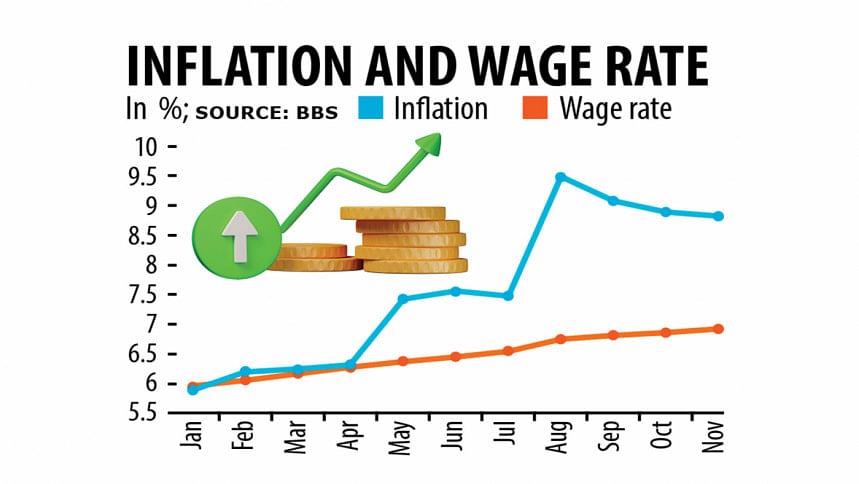Wage growth below inflation for 10th month

For the 10th consecutive month, monthly wage growth of workers has remained below inflation, a trend that indicates a worsening poverty situation as many people are being compelled to cut consumption amid falling real income.
In November this year, wages of low and unskilled workers grew 6.98 per cent, which was 1.87 percentage points below the average inflation rate of 8.85 per cent in the same month.
In October, wages of workers in 44 occupations in agriculture, industry and services grew 6.91 per cent against a consumer price hike of 8.91 per cent, showed data of the Bangladesh Bureau of Statistics (BBS).
"This clearly shows that real wage is on the downward trend," said Hossain Zillur Rahman, executive chairman of the Power and Participation Research Centre (PPRC).
"We see its expression as many people have to adjust household consumption, sacrifice nutrition, and other discretionary expenditures as inflation is higher than their income growth," he said.
He said the poverty situation was deteriorating and a large section of low and fixed-income people who were above the poverty level were at risk economically.
"Besides, many lower-middle-income families also face a tough time. However, they are not getting policy attention in terms of their needs," said Rahman.
"It seems that burden of resilience has wholly been put on the shoulders of people with low and fixed income and even on the middle class," he said.
The PPRC and BRAC Institute of Governance and Development (BIGD) carried out several rounds of a survey since April 2020 to assess the impacts of the Covid-19 induced health and economic crises on low-income groups.
"A vast majority is absent in the policy priority. It seems that survival is the job of this section of people," added Rahman.
Earlier this month, the Food and Agriculture Organization (FAO) in a report said Bangladesh was suffering from severe localised food insecurity owing to economic constraints, refugee influx, floods and high prices of important food items.
"Food insecurity as well as poverty levels has increased due to income losses caused by the effects of the Covid-19 pandemic," it added.
In November, consumers had to buy coarse rice at Tk 48.09 per kilogramme while also paying a record Tk 60.11 per kilogramme for wheat flour, both of which were much higher than what they were a year ago, according to the FAO data.
Selim Raihan, executive director of the South Asian Network on Economic Modeling (Sanem), said real income of people was falling consistently as wage growth was remaining below inflation.
"It means that people can buy less, and many are forced to exhaust their savings and other options against the backdrop of high inflation," he said.
"We do not have the latest data on the level of poverty, but studies show that many people who stay just above the poverty line could fall into poverty. A sizable portion of people are under tremendous pressure," he added.
Raihan, also a professor of economics at the University of Dhaka, then said high inflation may persist until the first quarter of next year.
Under this circumstance, the government should expand coverage and allocation of social protection schemes to prevent them from falling into deeper impoverishment, he said.
The first quarter of next year is very critical and the government should enable more allocations for social protection, even if it means shifting allocations from other projects, he said.
The BBS collects data to measure the movement of nominal and real wages of low paid skilled and unskilled labour in different segment through a wage rate index (WRI).
The November WRI data showed that workers in the agriculture, particularly fishermen, were the worst victims of high inflation as their income growth of 6.95 per cent stood below the increase in prices of goods and services in the same month.
Low and unskilled workers in the industrial sector followed suit while those in services were relatively better off as their wages grew 7.17 per cent, the highest pace attained among the three broad sectors.

 For all latest news, follow The Daily Star's Google News channel.
For all latest news, follow The Daily Star's Google News channel. 








Comments